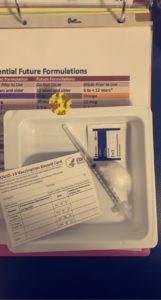FAQ: Pfizer Vaccine for Ages 5-11

The CDC approved the Pfizer COVID-19 vaccine for children 5-11 years old on November 2nd. Spring Valley Pediatrics is currently vaccinating our patients in this age group. To schedule an appointment for the vaccine, please call our front desk Monday through Friday from 9am-5pm. We are working hard to quickly accommodate our families so please be patient and understanding as not everyone can be first. It is important for your child to receive the vaccine and we stress getting the COVID-19 vaccine at any location if you are not able to get it at our office in a timely fashion.
The information below has been pulled from reputable sources, such as the Centers for Disease Control and the FDA. Links to the primary sources are at the end of this FAQ. If you have additional questions, please contact your pediatrician. We always welcome conversations regarding best decisions for your children.
What is the dose of the vaccine for children 5-11 years old and how many will my child need?
The Pfizer vaccine is a 10ug dose and is a two shot series. The shots should be separated by 21 days. If it’s been more than 21 days since your first shot, you can and should get a second dose.
Can my child receive the COVID-19 vaccine at the same time as others such as the flu shot?
Yes, the CDC says this vaccine may be administered without regard to timing of other vaccines. We strongly recommend receiving a flu shot each season.
My 11 year old child weighs as much as a 13 year old. Should she receive the bigger dose for kids 12+ instead?
No, all children ages 5-11 should receive the 10 ug dose. The vaccine dosage is based on age, not on size or weight.
My child has tested positive for COVID-19. Should he receive the vaccine and when?
Yes, it is important to vaccinate people who have had the illness as well. Your child should be vaccinated once he has recovered from the acute illness and has met criteria to discontinue isolation. Data also shows that it is safe to give the vaccine to children who have already been infected with the novel coronavirus. We also know that natural immunity from infection decreases overtime; vaccination helps to increase protection.
What side effects should I be prepared for in my child after vaccination?
The FDA noted that the medical data showed children may actually experience fewer side effects than adolescents or young adults. If your child does have side effects, they tend to be mild and include pain, swelling, or erythema at the injection site; fever, fatigue, headache, chills, myalgia (body aches), arthralgia (joint pain), or lymphadenopathy (enlarged lymph nodes). It is safe to give your child acetaminophen or ibuprofen afterwards if she is uncomfortable.
There was a lot in the news about myocarditis risk after vaccine. Is that a concern in this age group as well?
Myocarditis (inflammation of the heart muscle) and/or pericarditis (inflammation of the pericardium around the heart) have occurred rarely in some people after vaccination against COVID-19 (though it is more common to have it after COVID-19 infection). This was noted primarily in 12-29 year old males. In fact no cases of myocarditis or pericarditis were reported in the clinical trial for children 5-11 years old. While it is impossible to say that there is no risk of this complication after vaccination, it is a rare and unlikely event.
Isn’t the risk of COVID-19 to kids really low? Is it really necessary to vaccinate my 5-11 year old child?
Children are certainly at lower risk of developing severe disease from COVID-19 infection, but they are not exempt from it. Throughout the pandemic, infected children have experienced both short and long-term health complications as well as continued spread to others. There is also the risk of multisystem inflammatory syndrome (MIS-C), a serious complication of COVID-19 infection that can be fatal. COVID-19 is now one of the leading causes of death in children.
By getting vaccinated, children 5-11 years old are not only protecting themselves but also their communities. The more people vaccinated, the slower spread of the virus which decreases the opportunities for it to mutate into a more severe variant like we have seen with the Delta strain. Vaccinating this age group is an important step in controlling the novel coronavirus.


